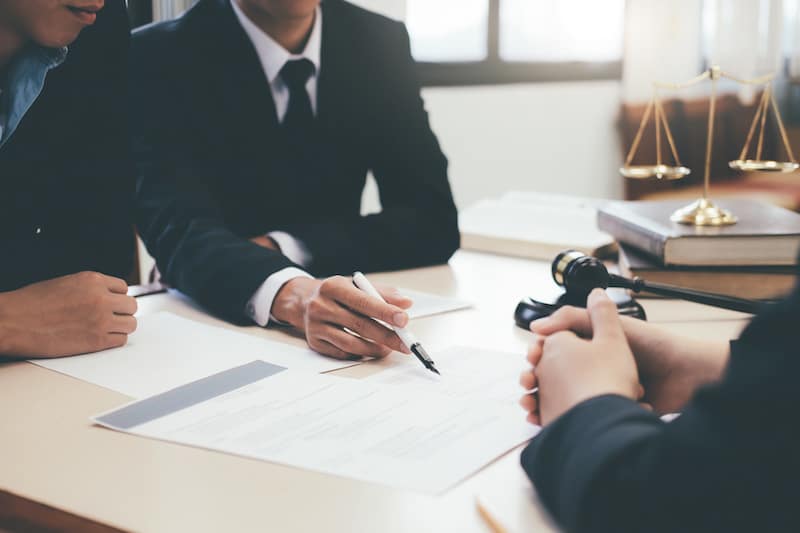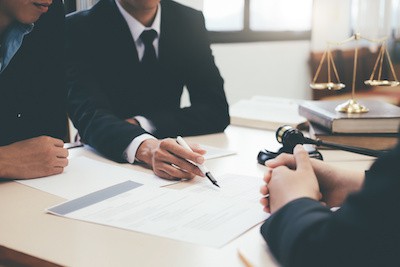
05 Aug Who Is Allowed to Attend Your Deposition? Essential Guide
Who Can Come to Your Deposition?
A deposition can be a very scary thing if you aren’t used to the legal process. It’s always a little intimidating thinking about what could happen while you’re there. What should you expect to happen at the deposition and who can be there? Are you allowed to have moral support or just legal counsel? Is a deposition open to the public? What are your rights as a deponent? Can you leave? All this and more will be answered below.
So, who can come to your deposition? Essentially, anyone that wants to attend is allowed to come. There is no Federal Rule of Civil Procedure that bars non-parties from attending. Although, usually the only people who come to the deposition are the person being questioned (also known as the deponent), the lawyers from both sides, and the court reporter or videographer.
I’m sure the idea of strangers watching your deposition is pretty uncomfortable, but don’t worry. Depositions are rarely attended by people who are not involved in the case. There are things that your lawyer can do to protect you though! In this post, we will provide you with the information that you need to walk into your deposition with confidence.
What is a Deposition?
You have likely found this post because of an upcoming deposition. Before we dive into the specifics of depositions, we need to understand the purpose behind a deposition. A deposition is a part of the investigative process of a legal case. During the deposition, the opposing counsel will ask you, the deponent, a series of questions to help them establish their case.
Although a deposition does not involve a judge and does not take place in a courtroom, you will be under oath. Because of this, you must take your deposition seriously and dedicate time to prepare for this meeting.
Depositions may also take place to preserve the testimony of a witness when the courtroom trial is several months away, or when the witness is not in a state to travel to give testimony during the trial. Depositions most often take place in person. However, in some cases, a deposition may take place over a video call, phone, or even paper.
You can learn more about the purpose behind depositions here.

Who Usually Attends a Deposition?
As you approach the date of your deposition, you likely have many questions surrounding how the day will go. One of the most common questions that individuals have as they prepare for upcoming depositions is who will be in attendance.
Generally, the only people present for the deposition are those required to be there. This includes:
- Attorney conducting the deposition
- Deponent
- Deponent’s legal counsel
- Other parties’ legal counsel
- Court reporter
Depending on the type of deposition the opposing counsel has requested, there may be a few other parties involved such as:
- Videographer
- Interpreter
- Expert witness
- A professional consultant from a local business
Your attorney should be able to provide you with more detailed information regarding who you can expect to be in attendance during your deposition.
In addition to the professionals listed above, many deponents wish to have friends or family members in attendance at their deposition for advice or moral support. As a general rule, anyone is legally allowed to attend a deposition unless there is a protective order that restricts their attendance.
Depending on the circumstances surrounding your deposition, there may be individuals on the side of the opposition who you do not wish to interact with. Luckily, there are ways that your lawyer can protect you in this situation and restrict their attendance.
Preventing People From Attending a Deposition
Every legal case involves complex relationships and circumstances. There are times when the presence of certain individuals could greatly influence the deposition process or cause great distraction.
Fortunately, there are ways that your lawyer can prevent this from happening if they are provided with that information ahead of time. A lawyer can obtain a protective order to exclude the individual from attending the deposition.
What happens an unexpected visitor shows up at your deposition? In most cases, you must proceed with the deposition. However, your legal counsel could suspend your deposition, applying for a protective order against the individual before the deposition resumes.
If you have concerns about who will or won’t be at your deposition, it is important that you discuss your concerns with your lawyer immediately. This will provide them ample time to react appropriately to the situation.
Understanding Your Rights As a Deponent
As you approach your deposition, you must understand your rights as a deponent. Having a knowledge of your legal rights will help you ensure that you are protecting yourself and your testimony throughout the course of your deposition.
Deponents Have a Right to Legal Counsel
Even if your deposition seems as if it will be rather straightforward, it is incredibly important to obtain legal counsel. As a deponent, you have a right to bring legal counsel with you to your deposition. You also have the right to have private counsel during the deposition. This can be critical to a successful deposition.
Unfortunately, the lawyer who is conducting the deposition will word their questions in a way that is meant to trick you into answering the way they desire. Since lawyers participate in depositions regularly, they know what to look for in these tricky questions. Protecting yourself by obtaining legal counsel is an imperative step towards a successful deposition.
Deponents Have a Right to Object Certain Questions
Due to the purpose of depositions, many of the questions that the opposing counsel asks may seem obtrusive. However, there are certain questions that you have the right to refuse. A lawyer cannot ask the following types of questions during a deposition:
- Questions regarding private information such as the health, race, sexuality, or religion of an individual.
- Questions regarding privileged information such as a topic discussed with a doctor, lawyer, priest, or any professional with a confidentiality agreement.
- Irrelevant information that does not directly pertain to the case.
If the opposing counsel asks a question that falls into one of these categories, it is your right to refuse the question. However, if the opposing counsel can easily explain why the answer is pertinent to the case, you may still be required to answer the question. Having a lawyer is invaluable in situations such as this.
 Preparing for Your Deposition
Preparing for Your Deposition
Proper preparation is key to a successful deposition. While much of a deposition is unknown until you arrive, there are a few areas that you can control. Here are some of the things that you can do leading up to your deposition.
Review the Details
During your deposition, you will be answering questions while under a legally binding oath. Because of this, it is incredibly important that you are providing thorough, accurate information. While you should never rehearse answers to deposition questions, it is wise to review the details surrounding the case. This will allow you to answer any deposition questions clearly, concisely, while not withholding information.
Prepare Your Physical Appearance
While a deposition does not take place in a courtroom, it is still an incredibly important aspect of your legal case. Many times, a lawyer will show your deposition to the jury as they make their case in court. The way you present yourself can make an incredibly impactful impression.
Your attire should be clean, professional, and understated. Remember that a deposition is not a fashion show nor an opportunity to display your personal sense of style. Dress for your deposition as if it was an important business meeting. You can find more insight on what to wear to a deposition here.
Because most of us do not participate in depositions regularly, they can be quite intimidating. Knowing some of the specifics surrounding the deposition including who you can expect to be in attendance can help eliminate some of the uncertainties of the deposition. We hope that the information shared in this post allows you to approach your deposition with confidence. If you have further questions about depositions, refer to our deposition tips here.





